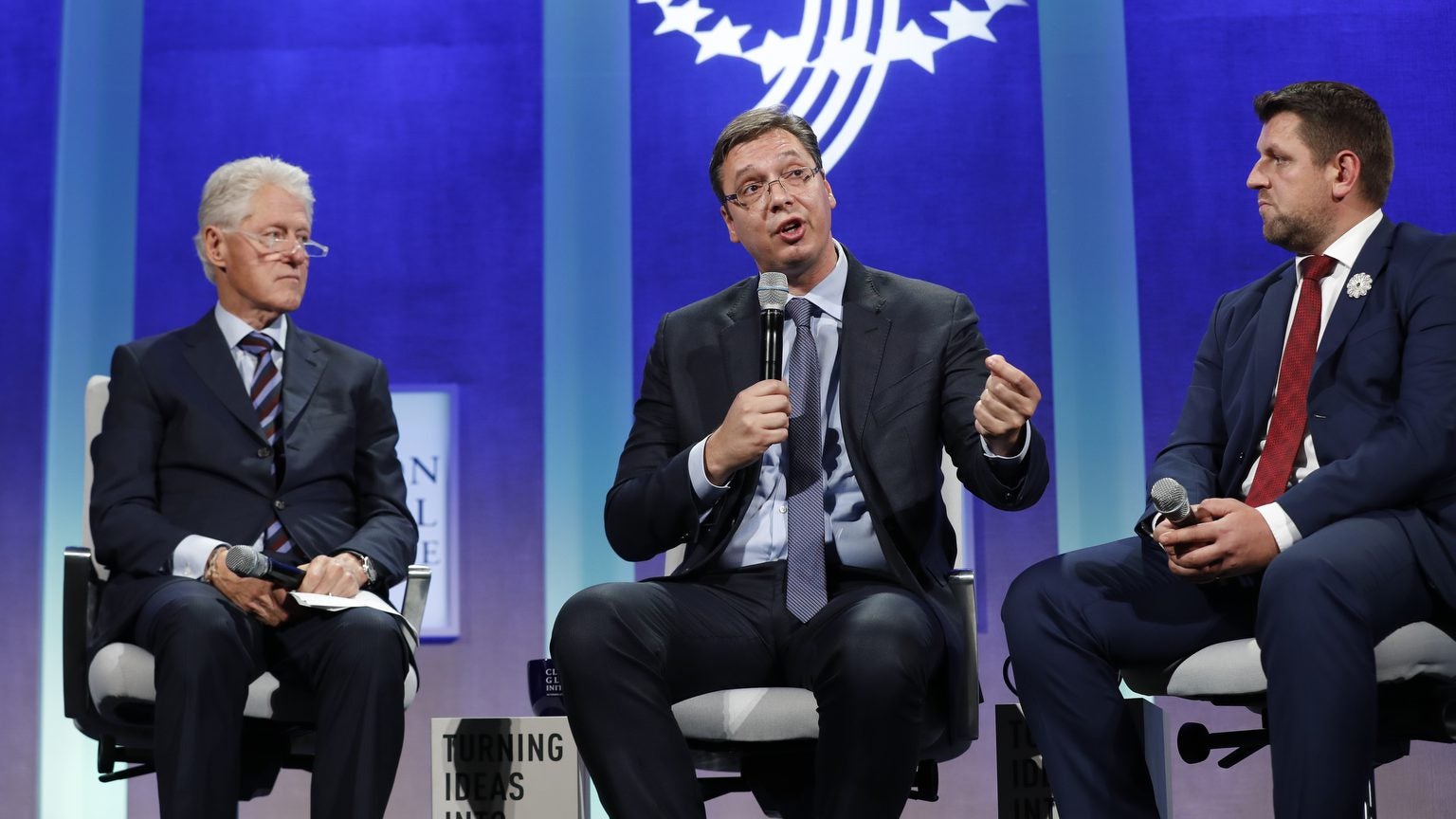A Serbian leader’s public reconciliation with Srebrenica offered a raw moment in a week of political platitudes
This week has featured a procession of politicians ascending the dais at the United Nations and Clinton Global Initiative to deliver lukewarm speeches and sit on panels offering platitudes.


This week has featured a procession of politicians ascending the dais at the United Nations and Clinton Global Initiative to deliver lukewarm speeches and sit on panels offering platitudes.
Then we heard from Aleksander Vucic, the prime minister of Serbia, at the Clinton meeting yesterday (Sept. 20).
On stage with former US president Bill Clinton, Vucic joined with Camil Durakovic, the mayor of Srebrenica—the town where Serbs slaughtered 8,000 Bosnians in 1995—to discuss the painful work of reconciling the horror committed by his people. “I’ll be very frank—it’s a lose-lose political situation for me,” Vucic said.
Meeting with the Bosnian mayor makes him unpopular in Serbia, while his nation is still mistrusted in Bosnia.
Vucic traveled to Srebenica last year, at the invitation of Durakovic, to commemorate the 20th anniversary of the massacre. When local Bosnians discovered who he was, he was pelted with rocks.
“Yes, I am a Serb, and a proud Serb and I’m proud to be Serbia’s prime minister,” he said. But “we need to acknowledge the terrible things we did.”
Vucic, 46, first won election in 2014 and supports closer ties to the West, and membership in the European Union. As a young man he served as propaganda minister for Serbian strongman Slobodan Milosevic, according to the Economist, but now says “I made mistakes, a lot, and I’m not afraid to say that.”
He’s determined to help right historic wrongs, and pushed for the arrest of 16 Serbian war criminals in the last 18 months, and pledged to pay €5 million to fund infrastructure in Srebrenica, of which €2 million has been spent on projects like a kindergarten.
The Srebrenica genocide included the forced removal and abuse of as many as 30,000 Bosnian women as well as the murder of its men and boys. It was described as the worst crime in Europe since World War II by Kofi Annan, former secretary general of the United Nations, which failed to prevent the slaughter.
Before the politicians took the stage, Advija Ibrahimovic, a Bosnian survivor, addressed the audience at the Clinton Global Initiative meeting, and described how she lost both her parents, including her mother, who was murdered by Serbs from a neighboring town. “Those were people who used to invite us for lunch,” she said.
The acrimony between the countries goes back centuries and is bitter. Vucic noted that the sides have never exchanged prisoners of war because none survived to exchange. He said that Bosnia was not blameless in the conflict, either, and neither side should be humiliated in the peace.
While his efforts at bridge building are unpopular at home, they’re necessary to prevent future bloodshed, Vucic said. There’s still “very fertile ground for hatred,” he said. “We need to live together, we need to work together. Otherwise I’m very afraid of the future of the Balkans.”
Durakovic praised Vucic’s courage for visiting Srebrencia, and pledged his continued support. “Reconciliation is a process,” he said. “It’s not a handshake, it’s not a dinner. It’s a process that may last as long as we may live.”
Clinton said the US needs to bolster their work. “We have not done enough to help the friends of peace triumph.”